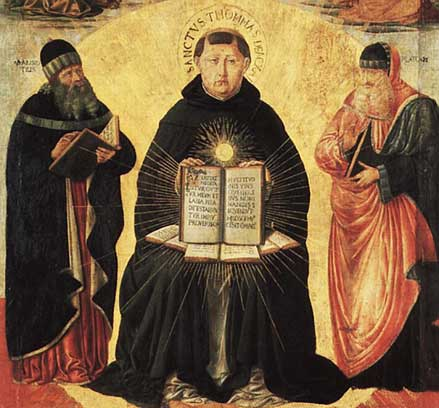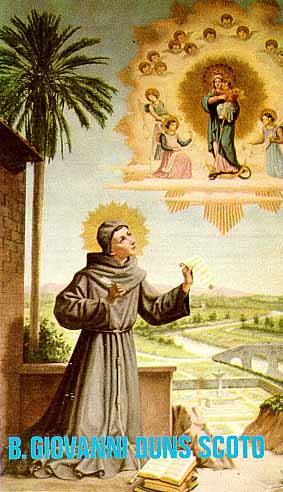
With all of my previous posts, one might have the false impression that I am “anti-Thomas.” Nothing could be farther from the truth. St. Thomas Aquinas is the champion of the stupendous doctrine on the Real Presence of Our Lord in the Holy Eucharist – “transubstantiation” – which is central to my life and spirituality (and that of any true Franciscan, or Catholic, for that matter); after all, he wrote the Mass and Office for Corpus Domini. The icing on the cake, at least for me, is that he speaks of the dignity of the Mother of God as a “quasi-infinite”: “The humanity of Christ, from the fact that it is united to the Godhead; and created happiness from the fact that it is the fruition of God; and the Blessed Virgin from the fact that she is the mother of God; have all a certain infinite dignity from the infinite good, which is God. And on this account there cannot be anything better than these; just as there cannot be anything better than God. “ (Summa I, Q 25, art.6 – 4th reply). God could not have created a more beautiful and glorious Mother, and to think that she is my Mother in the order of grace…
Viva St. Thomas!
While I may disagree with him when he says that it is “more probable” that the Incarnation of the Word was willed by God primarily (or even exclusively) as a remedy to sin, that does not mean I am against him. St. Thomas Aquinas has fought the good fight, taken his crown, and is a canonized Saint and Doctor of the Church; I, on the other hand, need his prayers, example and teachings to help me work out my salvation with fear and trembling (cf. Phil 2:12). So…
St. Thomas Aquinas, pray for me, that I too may be made worthy of the promises of Christ!
That said, and having commented from a scotistic point of view on his teaching regarding the primary motive for the Incarnation, I would like to underscore that he never excludes the possibility of the contrary position that Christ’s coming in the flesh could have been God’s will even if Adam had not sinned. The teaching of the Angelic Doctor is that there are two opinions:
There are different opinions about this question. For some say that even if man had not sinned, the Son of Man would have become incarnate. Others assert the contrary… (Summa Theologica III, I, 3)
So the latter, for him, was “more probable,” yet he concludes his presentation with, “Even had sin not existed, God could have become incarnate” (ibid). In his commentary on the Sentences he states regarding an unconditional Incarnation that this “opinion can also be called probable” (In Sent. III, d.1, q.1, a.3). That said, St. Thomas does not rule out what will come to be known as the Franciscan thesis which was especially developed and championed by Bl. John Duns Scotus. Rather, he sees it as “possible” and even “probable,” while embracing the view that he deems “more probable.”

Bl. John Duns Scotus, on the other hand, is very articulate and definitive on the subject. Unlike Thomas who sees both views as opinions worthy of consideration and doesn’t give much weight to the argument (i.e. Aquinas writes, “this is not a very important question” In 1 Tim., c.1, lect.4), the Subtle Doctor does not consider the position of “no sin, no Incarnation” as possible or probable because, according to logic and the Scriptures, this was not God’s plan and is not how God operates. And, obviously, for him the question was central.
The scotistic doctrine on the absolute primacy of Christ constitutes, to use Dr. Mark Miravalle’s comment, “a Copernican revolution” in Theology (and consequently Mariology) because it places Christ the Sun of Justice and His Immaculate Mother clothed with the sun at the center of God’s plan, as opposed to placing Adam and Eve and the earthly paradise at the center and attempting to “measure” Christ and Mary according to man’s need for redemption from sin. I think it is clear enough that a christocentric Theology, Christology, Mariology, Angelology and spirituality have different accents and rhythms than that which results from a Theology where Christology is centered on sin – even if both positions uphold all of the essential dogmas of the Faith. The difference is huge, just as in our solar system there is huge difference between saying the sun is at the center or the earth, even if everything can be calculated (with great difficulty) by saying that the earth is at the center, when everyone was crying out, “Earth centered!”, the idea of a solar system was revolutionary.
Since I have already extensively treated Scotus’ positions throughout this website, I will not repeat that work in the posts, but I do hope to highlight some of his principle arguments and then frequently quote and refer to his thoughts throughout future posts and discussion. An Overview of his doctrine of the absolute primacy of Christ and his specific Writings on the subject are available at the links.
fr. maximilian mary dean, F.I.
